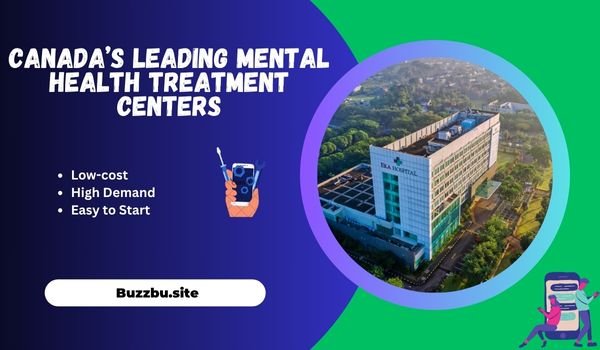You’re not alone. Millions of Canadians walk this path each year. The good news? In 2025, Canada offers more pathways to healing than ever before, with exceptional treatment centers leading the way in compassionate, effective care.

Finding the right support can feel overwhelming, but understanding your options is the first, powerful step towards reclaiming your well-being.
Why Look for Specialized Mental Health Centers?
While family doctors and community counselors provide vital support, specialized mental health treatment centers offer deeper resources for complex or persistent challenges. These centers bring together multidisciplinary teams – psychiatrists, psychologists, therapists, social workers, nurses, and often peer supporters – under one roof.
They provide intensive programs, evidence-based therapies often not widely available elsewhere, structured environments for focused healing, and wrap-around support that addresses the whole person, not just a diagnosis.
What Makes a Canadian Mental Health Center “Leading” in 2025?
Canada’s best centers in 2025 aren’t just about prestigious names; they embody key qualities that make a real difference in your recovery journey:
Personalized, Not Prescriptive: They understand you are unique. Treatment plans aren’t one-size-fits-all but are carefully crafted based on your specific history, needs, strengths, and goals. Your voice matters in shaping your care.
Evidence-Based & Innovative: They use therapies proven to work, like Cognitive Behavioural Therapy (CBT), Dialectical Behaviour Therapy (DBT), EMDR for trauma, Acceptance and Commitment Therapy (ACT), and mindfulness-based approaches. Many also pioneer or integrate newer modalities, including specialized trauma therapies, neurofeedback, and ketamine-assisted therapy (where clinically appropriate and regulated).
Holistic Care: Recognizing that mental health is intertwined with physical health, life circumstances, and community, top centers often integrate nutritional counseling, occupational therapy, fitness programs, art or music therapy, and family support services.
Focus on Accessibility & Diversity: Leading centers actively work to reduce barriers. This includes cultural safety training for staff, programs tailored for specific communities (LGBTQ2S+, Indigenous peoples, newcomers, youth, seniors), offering virtual care options, and providing clear information on costs and funding support.
Compassion & Dignity at the Core: Above all, the best environments treat you with unwavering respect, kindness, and understanding. You are seen as a person, not a problem. Stigma has no place here.
Spotlight on Canada’s Leading Mental Health Treatment Centers (2025)
While numerous excellent facilities exist across the country, these centers consistently stand out for their comprehensive programs, national reach, and commitment to excellence in 2025:
CAMH (Centre for Addiction and Mental Health – Toronto, Ontario): As Canada’s largest mental health teaching hospital and a world leader in research, CAMH offers an unparalleled breadth of specialized programs. From complex mood and anxiety disorders, schizophrenia, and concurrent disorders (mental health + substance use) to dedicated youth services, geriatric psychiatry, and groundbreaking trauma therapy, CAMH handles the most challenging cases.
Homewood Health Centre (Guelph, Ontario): One of Canada’s largest and most renowned private mental health and addiction treatment facilities. Homewood excels in providing structured, intensive residential programs for depression, anxiety, PTSD, burnout, and eating disorders.
The Royal Ottawa Mental Health Centre (Ottawa, Ontario): A leader in both clinical care and research, particularly known for its expertise in mood disorders (like depression and bipolar disorder), anxiety, operational stress injuries (e.g., PTSD in military/police), and early intervention in psychosis.
Vancouver Coastal Health – Mental Health and Substance Use Services (Vancouver, BC): While not a single “center,” VCH operates a highly integrated network of specialized clinics and programs across Vancouver and coastal BC.
Alberta Hospital Edmonton (Edmonton, Alberta): Part of Alberta Health Services, this large facility provides critical acute and specialized longer-term mental health services for adults. It houses specialized units for forensic psychiatry, geriatric psychiatry, neuropsychiatry, and complex treatment-resistant conditions. They play a vital role in the provincial mental health system, often serving those with the most severe illnesses.
Bellwood Health Services (Toronto, Ontario): A premier private center specializing in treating trauma, PTSD, and related conditions like addiction, anxiety, and depression. Bellwood is particularly noted for its intensive, trauma-focused programming using therapies like EMDR and somatic experiencing within a safe, supportive residential setting. They also offer specialized programs for workplace trauma and first responders.
Woods Homes (Calgary & throughout Alberta): A beacon of hope specifically for children, youth, and families. Woods Homes provides a wide range of community-based and residential mental health services across Alberta. They specialize in helping young people facing significant challenges, including trauma, severe emotional dysregulation, and family breakdown, with a strong focus on building resilience and family support. Their programs are vital for early intervention.
Mood Disorders Association of British Columbia (MDA BC) – Virtual & In-Person Programs (Vancouver, BC): While primarily community-based, MDA BC deserves mention for its exceptional, accessible peer-led and professionally supported programs specifically for depression and bipolar disorder. They offer support groups, skill-building workshops, one-on-one coaching, and online resources, filling a crucial gap for ongoing management and community connection alongside clinical care. Their model is highly effective and replicable.
Navigating Access and Costs: Real Talk
Understanding how to access these centers and manage costs is crucial:
- Public vs. Private: CAMH, The Royal, Alberta Hospital Edmonton, and VCH services are publicly funded. Access usually requires a referral from a doctor, and wait times for non-urgent programs can exist. Homewood, Bellwood, and some intensive programs at others are private, meaning you pay out-of-pocket or through private insurance. Wait times are typically shorter.
- Provincial Health Coverage (OHIP, MSP, etc.): This covers medically necessary services provided by psychiatrists and within public hospitals/clinics. It generally does not cover private therapy fees, private residential centers, or certain types of therapy unless delivered within the public system.
- Private Insurance: Many employer health plans cover psychologists, social workers, and portions of private treatment programs. Check your plan details carefully.
- Sliding Scales & Subsidies: Some public programs and community organizations offer services based on ability to pay. Ask.
- Virtual Care: Many centers now offer virtual therapy and support groups, increasing access, especially in rural areas. Check if covered by your province or insurance.
Taking the First Step: Your Journey Matters
Choosing the right mental health support is deeply personal. Here’s how to start:
- Talk to Your Doctor: Your GP is a key ally. Discuss your concerns; they can assess your needs, provide referrals to specialists or programs, and advise on funding options.
- Be Specific About Your Needs: Are you seeking crisis support, intensive residential care, specialized trauma therapy, help for a teenager, or ongoing outpatient management? Knowing your priorities helps narrow the search.
- Research: Visit center websites. Look for their areas of specialization, treatment philosophies, program details (inpatient, outpatient, day programs), and patient testimonials. Contact their intake departments with questions.
- Ask About Wait Times & Costs: For public services, ask about current wait times. For private centers, request detailed fee schedules and what’s included. Ask about insurance pre-authorization.
- Trust Your Instincts: During an initial assessment or phone call, pay attention to how you feel. Do you feel heard, respected, and hopeful? The right therapeutic relationship is fundamental.
Frequently Asked Questions (FAQs)
Q1: How long are the wait times to get into these top centers, especially public ones?
A: Wait times vary significantly depending on the center, the specific program, the urgency of your situation, and your location. For non-urgent outpatient programs in the public system, waits can sometimes be several months. Urgent cases and hospital-based care are prioritized.
Q2: I’m worried about the cost, especially for private treatment. Are there any financial assistance options?
A: This is a very common concern. Explore these avenues:
- Private Insurance: Maximize your coverage. Understand your limits for psychology, social work, and residential treatment.
- Public Programs: Ensure you’ve accessed all eligible publicly funded services.
- Sliding Scale Fees: Some therapists and even some programs within larger centers offer fees based on income.
- Charitable Organizations: Groups like the Canadian Mental Health Association (CMHA) branches or specific disorder associations (like MDA BC) may offer subsidized programs or support groups.
- Payment Plans: Some private centers offer payment plans. Ask!
- Tax Deductions: In Canada, medical expenses exceeding a certain threshold (including therapy from registered professionals) can be claimed on your income tax return. Keep receipts.
Q3: How do I know which center or type of program (inpatient vs. outpatient) is right for me or my loved one?
A: This depends on the severity and nature of the struggles:
- Outpatient Therapy: Best for ongoing management, moderate symptoms, or step-down after intensive care. You live at home and attend sessions weekly or bi-weekly.
- Day Programs (Partial Hospitalization): Provide structured therapy (e.g., 5 days/week, 6 hours/day) for significant symptoms while allowing you to sleep at home. Good for stabilizing crises or preventing hospitalization.
- Inpatient/Residential: Necessary for acute safety concerns (suicidal thoughts, inability to care for oneself), severe symptoms requiring 24/7 monitoring and intensive daily therapy, or for specialized programs (like trauma or eating disorder treatment) needing a contained environment. Your doctor or an intake assessment at a center can help determine the appropriate level of care.
Your Path to Healing Starts Today
Reaching out for help is the bravest and most important step on your mental health journey. Canada’s leading treatment centers in 2025 offer beacons of hope, combining clinical excellence with deep humanity.
Don’t let fear of wait times or costs paralyze you. Start the conversation with your doctor, explore the resources, ask the questions. Healing is possible. Well-being is within reach. Take that deep breath and reach out – your path to a brighter, healthier future begins now. You deserve support, you deserve care, and you deserve peace.




